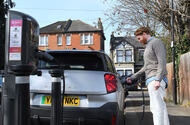Thinking about making the leap to an electric vehicle (EV)? One of the first questions you’ll likely have is about charging costs. While it might seem straightforward, the reality is a bit more nuanced. Let’s break it down to help you understand what to expect.
How Much Does It Cost to Charge an Electric Car at Home?
Charging at home is generally the most economical option for EV owners. Even with rising electricity prices, you’ll often find that topping up your electric car is cheaper than filling up a petrol or diesel vehicle. For instance, if you own a Kia Niro EV with a 64.8 kWh battery, charging it from empty to full at home would cost around £17.50, based on a capped tariff of 27p per kWh. However, most drivers don’t wait until their battery is completely drained. Typically, you might charge from about 20% to 80%, which can significantly lower your costs.
If you’re savvy about your energy usage, consider signing up for an EV-friendly tariff. These plans often offer lower rates during off-peak hours. For example, E.on provides a rate of just 6.7p per kWh during the night, meaning a full charge could cost you less than £5. Plus, if you have solar panels, you can utilize that ‘free’ energy to charge your EV, further cutting down on costs.
What About Home Charging Equipment?
To make the most of home charging, investing in a wallbox is a smart move. While you can technically use a standard three-pin plug, it’s slow and not recommended for regular use. A dedicated wallbox can charge your car at rates of up to 7 kW, which is more than twice as fast. Prices for these units range from £500 to £1,500, but many manufacturers offer incentives, such as free wallbox installation with the purchase of an EV.
If you’re renting or live in a flat, don’t worry! The government offers a charge point grant that can cover up to £350 or 75% of the installation cost, whichever is lower. This makes it easier for everyone to access home charging solutions.
Understanding Public Charging Costs
Public charging can be a bit trickier. The cost varies widely based on the type of charger you use—slow, fast, rapid, or ultra-rapid—and the provider. For example, charging a Vauxhall Corsa Electric with a 50 kWh battery could cost around £12.43 with a slow charger, £25 with a fast charger, and £38 with a rapid charger.
Providers like BP Pulse offer subscription services that can help you save on costs if you frequently use public chargers. For a monthly fee, you can access discounted rates, which can be a game-changer for long-distance travelers.
Keep in mind that some locations, such as hotels and shopping centers, may offer free charging, so it’s worth checking your options. Many EV manufacturers also provide access to multiple charging networks, simplifying the process for their customers.
Motorway Charging: What to Expect
Charging at motorway service stations tends to be pricier, typically ranging from 60p to 85p per kWh. Additionally, there may be activation fees that can vary significantly. Always check the specifics before plugging in, as these fees can add up quickly.
Is Charging Cheaper Than Fueling a Petrol or Diesel Car?
When comparing costs, it’s essential to consider various factors, including the type of charger and your membership status with charging networks. Generally, charging at home is where you’ll see the most savings. For example, charging the Kia Niro EV at home costs about 7p per mile, while refueling a Kia Niro Hybrid at the average petrol price would set you back around 12p per mile.
However, if you rely on public charging, especially at motorway service stations, the cost per mile can increase significantly. To mitigate this, consider subscribing to a charging network that offers lower rates.
The big takeaway? Charging an electric car isn’t about perfection—it’s about making smarter adjustments. Start by exploring home charging options and consider your public charging strategy. With a little planning, you’ll likely spot the difference in your monthly expenses by the end of the month.

